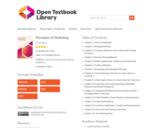
OER Text
- Subject:
- Business and Communication
- Marketing
- Material Type:
- Textbook
- Author:
- Open Textbook Library
- Date Added:
- 01/25/2022

OER Text
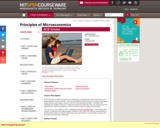
Principles of Microeconomics is an introductory undergraduate course that teaches the fundamentals of microeconomics. This course introduces microeconomic concepts and analysis, supply and demand analysis, theories of the firm and individual behavior, competition and monopoly, and welfare economics. Students will also be introduced to the use of microeconomic applications to address problems in current economic policy throughout the semester.
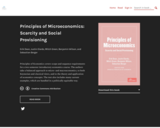
Principles of Economics covers scope and sequence requirements for a two-semester introductory economics course. The authors take a balanced approach to micro- and macroeconomics, to both Keynesian and classical views, and to the theory and application of economics concepts. The text also includes many current examples, which are handled in a politically equitable way.

Principles of Microeconomics for AP Courses covers the scope and sequence for a one-semester Advance Placement Microeconomics course. The book is on the example textbook list for the AP course here. The text also includes many current examples, including; the Keystone Pipeline, Occupy Wall Street, and debates over the minimum wage.
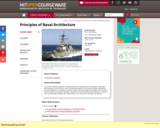
This course presents principles of naval architecture, ship geometry, hydrostatics, calculation and drawing of curves of form, intact and damage stability, hull structure strength calculations and ship resistance. It introduces computer-aided naval ship design and analysis tools. Projects include analysis of ship lines drawings, calculation of ship hydrostatic characteristics, analysis of intact and damaged stability, ship model testing, and hull structure strength calculations.
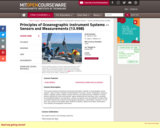
This course introduces theoretical and practical principles of design of oceanographic sensor systems. Topics include: transducer characteristics for acoustic, current, temperature, pressure, electric, magnetic, gravity, salinity, velocity, heat flow, and optical devices; limitations on these devices imposed by ocean environments; signal conditioning and recording; noise, sensitivity, and sampling limitations; and standards. Lectures by experts cover the principles of state-of-the-art systems being used in physical oceanography, geophysics, submersibles, acoustics. For lab work, day cruises in local waters allow students to prepare, deploy and analyze observations from standard oceanographic instruments.
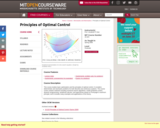
Studies the principles of deterministic optimal control. Variational calculus and Pontryagin's maximum principle. Applications of the theory, including optimal feedback control, time-optimal control, and others. Dynamic programming and numerical search algorithms introduced briefly.
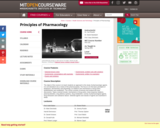
An introduction to pharmacology. Topics include mechanisms of drug action, dose-response relations, pharmacokinetics, drug delivery systems, drug metabolism, toxicity of pharmacological agents, drug interactions, and substance abuse. Selected agents and classes of agents examined in detail.
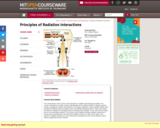
Explores the interaction of radiation with matter at the microscopic level from both the theoretical and experimental viewpoints. Emphasis on radiation effects in biological systems. Topics include energy deposition by various types of radiation, including the creation and behavior of secondary radiations; the effects of radiation on cells and on DNA; and experimental techniques used to measure these radiation effects. Cavity theory, microdosimetry and methods used to simulate radiation track structure are reviewed. Examples of current literature used to relate theory, modeling, and experimental methods. Requires a term paper and presentation. The central theme of this course is the interaction of radiation with biological material. The course is intended to provide a broad understanding of how different types of radiation deposit energy, including the creation and behavior of secondary radiations; of how radiation affects cells and why the different types of radiation have very different biological effects. Topics will include: the effects of radiation on biological systems including DNA damage; in vitro cell survival models; and in vivo mammalian systems. The course covers radiation therapy, radiation syndromes in humans and carcinogenesis. Environmental radiation sources on earth and in space, and aspects of radiation protection are also discussed. Examples from the current literature will be used to supplement lecture material.
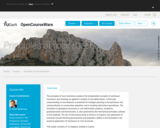
The principles of rock mechancis explains the fundamental concepts of continuum mechanics and rheology as applied in studies of rock deformation. A thorough understanding of rock behavior is essential for strategic planning in the petroleum and mining industry, in construction operation, and in locating subsurface repositories. The formation of geological structures or rock deformation patterns, studied by geodynamicists and tectonicians, is, also governed by the mechanical principles outlined in this textbook. The aim of the present book is obvious: to inspire a new generation of positively forward-thinking geoscientists and engineers, skillful in and favorable to the practical application of mechanics to rock structures.
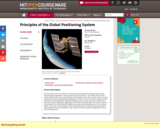
The aim of this course is to introduce the principles of the Global Positioning System and to demonstrate its application to various aspects of Earth Sciences. The specific content of the course depends each year on the interests of the students in the class. In some cases, the class interests are towards the geophysical applications of GPS and we concentrate on high precision (millimeter level) positioning on regional and global scales. In other cases, the interests have been more toward engineering applications of kinematic positioning with GPS in which case the concentration is on positioning with slightly less accuracy but being able to do so for a moving object. In all cases, we concentrate on the fundamental issues so that students should gain an understanding of the basic limitations of the system and how to extend its application to areas not yet fully explored.

This 6-unit subject gives students the opportunity to immerse themselves in the poetry of two living Nobel Laureates: the Caribbean poet, Derek Walcott, and the Northern-Irish poet, Seamus Heaney. We will begin and end the semester with their magnificent epic works: Heaney's translation of the Anglo-Saxon epic Beowulf, and Walcott's Omeros (a modern epic set in the West Indies). Between these major narrative poems, we will read a rich selection of their shorter poems, as well as some of their reflections in prose on what poetry does, on what other poets do, and what it means to write in English from the historical and political situation of Northern Ireland (for Heaney) or the Caribbean (for Walcott).
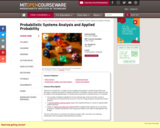
Welcome to 6.041/6.431, a subject on the modeling and analysis of random phenomena and processes, including the basics of statistical inference. Nowadays, there is broad consensus that the ability to think probabilistically is a fundamental component of scientific literacy. For example: The concept of statistical significance (to be touched upon at the end of this course) is considered by the Financial Times as one of "The Ten Things Everyone Should Know About Science". A recent Scientific American article argues that statistical literacy is crucial in making health-related decisions. Finally, an article in the New York Times identifies statistical data analysis as an upcoming profession, valuable everywhere, from Google and Netflix to the Office of Management and Budget. The aim of this class is to introduce the relevant models, skills, and tools, by combining mathematics with conceptual understanding and intuition.
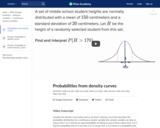
Examples finding probabilities from probability distributions for continuous random variables.
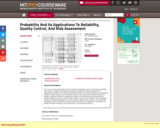
Interpretations of the concept of probability. Basic probability rules; random variables and distribution functions; functions of random variables. Applications to quality control and the reliability assessment of mechanical/electrical components, as well as simple structures and redundant systems. Elements of statistics. Bayesian methods in engineering. Methods for reliability and risk assessment of complex systems, (event-tree and fault-tree analysis, common-cause failures, human reliability models). Uncertainty propagation in complex systems (Monte Carlo methods, Latin Hypercube Sampling). Introduction to Markov models. Examples and applications from nuclear and chemical-process plants, waste repositories, and mechanical systems. Open to qualified undergraduates.
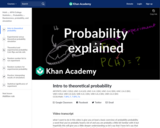
This lesson introduces basic probability. [Probability playlist: Lesson 1 of 29]
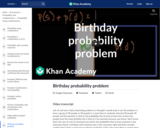
This lesson is a birthday problem that determines the probability that at least 2 people in a room of 30 share the same birthday. [Probability playlist: Lesson 17 of 29]
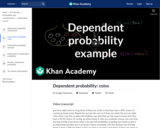
This lesson presents an example of dependent probability. [Probability playlist: Lesson 10 of 29]
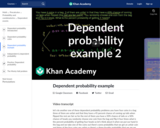
This lesson presents an example of dependent probability. [Probability playlist: Lesson 11 of 29]
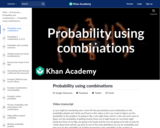
This lesson demonstrates probability using combinations and shows the probability of getting exatly 3 heads in 8 flips of a fair coin. [Probability playlist: Lesson 14 of 29]